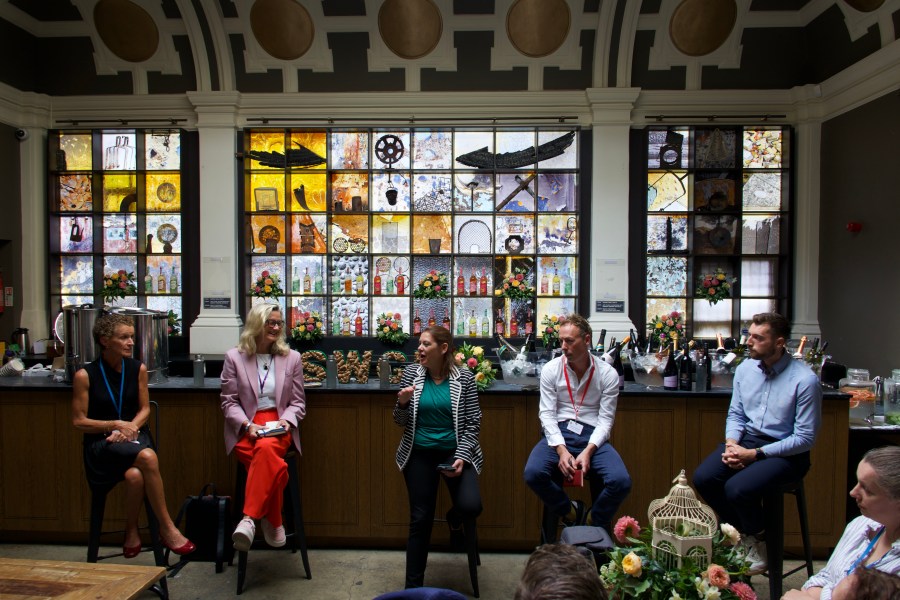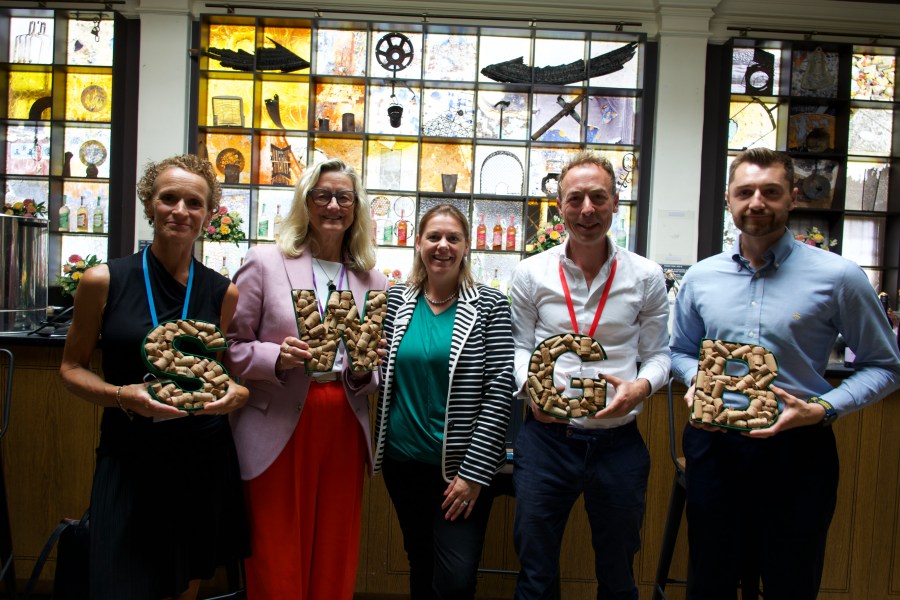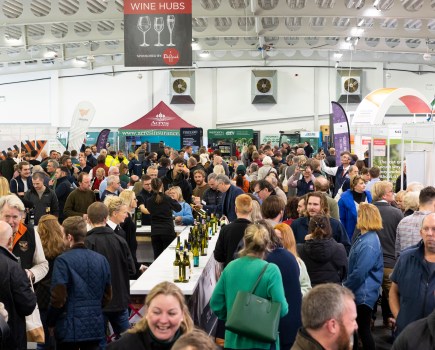The WineGB Trade and Press tasting included a discussion based around sustainability in viticulture and how to expand the conversation regarding how to create value from the commitment to sustainability.
The panel of Ruth Simpson, Simpson Wine Estate; Patrick Schmitt MW, Editor of Drinks Business; Sue Daniel, M&S Winemaker and Senior Technologist; and Luke Harbour, Group Beverage Director of the Pig Hotels was designed to engage with the audience providing insight from the on-trade, the off-trade and producers. Hosting the discussion Anne Jones the sustainability ambassador for WineGB said: “Sustainability particularly in viticulture has to be collaborative and that is one of the brilliant things about English and Welsh wines; just how people are working together sharing successes and failure explaining what does and what does not work.”
Representing producers Ruth Simpson of Simpsons Wine Estate was asked how the business’s commitment to sustainability was justified. “I think it all comes down to the value judgements that we make. I have been raised to believe that we are stewards of the land and as a grower/producer we have that as a basis for all we do. There are some extra costs for example if we use sustainable fertiliser in the vineyard that does cost a little but more but in a lot of cases some of the choices we have made at Simpsons have actually saved money further down the line for example two years ago we achieved our goal of installing a solar array on one of our wine storage buildings which was a significant investment but we are now able to generate 34% of our electricity needs across our business. We are also able to generate some income at certain times by exporting some to the grid. That is a tangible example that we can show visitors to our estates because consumers now are a lot more knowledgeable with a lot more interest and a lot more expectation of the product that they are going to buy.”
On the expectation from consumers Patrick Schmitt commented: “The idea and the move towards sustainability has been the biggest shift and the most important that I have seen in my 20 year career but the term sustainability is a bit vague and is really hard to define. I think the term organic is well understood by the consumer. In terms of the wine market globally the sale of wine is not in growth but the sale of organic wine is in growth. We are doing analysis of the fine wine market and collectors at the top end expect a wine to be made in an organic or biodynamic and certainly as clean as possible in terms of the eco credentials not so much because of an interest in an eco product but because they expect it to be artisanal and hands on and this tends to overlap with organics and regenerative viticulture.”
An audience comment pointed out that in a marginal climate growing organically may not actually be the best choice in terms of sustainability for example the use of diesel and tractor time would not be considered as part of an organic system and sprays such as copper can be used in an organic system in an untargeted way but that is not in line with sustainable principles.
Since the concept of sustainability is complicated Sue Daniel commented: “As a retailer we introduced Plan A (a commitment to combat climate change, encourage ethical trading practices and reduce waste) in 2007 because we felt that it was the right thing to do and customers trust us to do the right thing and so that is where we start from. We are not just about wine and we have some big challenges in areas such as clothing and homewear there is a much bigger carbon footprint for some of those materials. We have done a big marketing campaign to help people understand what sustainability means. In a recent survey 64% are actively leading a life that they believe will be more sustainable so we know that resonates with our customers. We are asking all our suppliers to have a sustainable programme and we are actively involved in the sustainable wine round table to reduce our bottle weights.
Anne Jones pointed out to the audience that materiality is a part of sustainability which looks at what is most relevant and what is most important and within wine from an emissions perspective the answer is the glass in the bottles and from a mitigation perspective it is soil organic carbon.
A question from the floor addressed the balance between a business need and a consumer want. The example given was that of a restaurant that is having to deal directly with producers and then receiving deliveries from multiple locations which then increases the carbon footprint of the restaurant business. Luke Harbour, Group Beverage Director of the Pig Hotels Group said: “There needs to be value at all elements of the wine list and it is important that the wines on the list do have sustainability credentials that are appropriate for that wine region or that wine style. You can strike a balance between your wine list being sustainable and having diversity of styles. At Pig Hotels our sourcing policy with food is local where we can we have a kitchen garden at every property and what we can’t grow ourselves we source from with 25 miles of the hotel beyond that we look at accreditation such as B Corp and Fair Trade but when it comes to wine the ownership is on us to embody sustainability into those wine lists. Every bottle of wine that goes onto our list goes through a rigorous selection process and our customers expect us to do this. There is a conscious consumer that is coming to us and it is our responsibility to make sure that (sustainability) is in the bedrooms, the food and the wine list.”
Sue Daniel highlighted how overwhelming the idea of sustainability can be when taken as a whole but taking little steps is the way to make sure it starts. It was clear that there are a number of programmes that are offering advice such as The Porto Protocol, Regenerative Farming and the International Wineries for Climate Action (IWCA).
The costs of being part of an accredited scheme can vary greatly and as sustainability gains greater traction there are more schemes available so it is worth noting that not all certification schemes are the same and there is research being undertaken looking at what is available through different schemes and what the costs and benefits of certain schemes will be.
As viticulture in England and Wales moves forward, free from historic rules, there is much positive work being done by many within the industry to encourage thoughts and processes that will start and continue the regenerative, sustainable journey. Although there is no solution yet there is a positive impetus to find a measurable way to indicate sustainability and regenerative viticulture as something tangible that the end consumer can assign a true value to.

For more like this, sign up for the FREE Vineyard newsletter here and receive all the latest viticulture news, reviews and insight




